|
Short Fiction ~ Cath Barton Honourable Mention, Strands International Flash Fiction Competition - 16 It was terribly hot on the top deck of the bus. Miriam thought she would faint, but what she saw two seats in front jolted her into alertness, and she elbowed her sister, pointing at the curly-headed man and the lion’s tail, though there was no sign of a lion’s body. The women looked at one another. As Miriam was about to speak there came a blast as of a circus band, and the man held up a banana to his ear: ‘Hello bra, I’m on a buskin full of pepsins. It’s very noisy. Much worse than anything in the cirrus.’ The man laughed, a high nasal sound. As he did so he half-turned; his face was painted white and he had two red circles on his cheeks, which creased with his smile. Miriam and her sister looked at one another again and leaned forward, but whatever the person on the other end of the call was saying was just a series of squeaks to them. ‘What’s that? I can’t hear you. Speak up.’ The sounds from the other end got louder, but, to the two women, no clearer. When the bus reached the next stop the people in the seat between them and the man who was talking got off, and Miriam and her friend slipped in immediately behind him. ‘Yes, yes, yes. Don’t worry. I’ve got the camouflet with me. So if we see the querimony I’ll be able to bring you back a piddock or two.’ The man held the banana away from his ear as there was something like an explosion from whoever was on the other end of the conversation. Then he laughed some more. ‘Yes. No. No. No procacity!You want anything else?’ Static on the other end. Then a woman’s voice. ‘Hello, Phyllis. Like I said to Clip, don’t worry. You go and attend to your poonacs. See you later.’ As the bus approached Victoria Station the man turned. ‘Is this where I get off for Buckingham Palace?’ he asked, in perfect English. Miriam nodded, her voice somehow stuck in her throat. The man pulled out a rose from somewhere, twirled it in his fingers and held it out to her. ‘Thank you, dear lady,’ he said. As he stood up and moved down the gangway of the bus the lion-tail twitched behind him. Miriam turned to her sister, wide-eyed, and as she did so water squirted up out of the rose and fell on them both like a refreshing shower of rain. At least that was what she told people afterwards. She couldn’t remember any of the strange words the man had spoken, though. It was as if the water had washed them all away. ~  Cath Barton is an English writer who lives in South Wales. She won the New Welsh Writing AmeriCymru Prize for the Novella 2017 for The Plankton Collector, now published by New Welsh Review under their Rarebyte imprint. Her second novella, In the Sweep of the Bay, will be published in November 2020 by Louise Walters Books. Cath’s short stories have been published by print magazines including The Lonely Crowd and Strix, as well as in a number of anthologies. She is also active in the online flash fiction community. Website: https://cathbarton.com Twitter: @CathBarton1
0 Comments
Short Fiction ~ Cyril Dabydeen Honourable Mention, Strands International Flash Fiction Competition - 16 Her crinkly glare with her Russian-immigrant sensibility, I know, or not know. Winter a-coming, and being in Ottawa again--as she laments, “Now the only place where I want to be is at the bus station.” Her wry, but sardonic way, it seems. “And at the train station.” A pause. “The airport, also.” But why? Flashback: to St Petersburg, see. Not cold there, too? In Moscow also, where Lenin’s mausoleum is still intact, like falsifying time itself. “It all depends on what you’re looking for,” Vanessa counters. Now what am I looking for? Slender or willowy she is, here in her new city, or new country, but like her predestined place. And she hated the former Soviet Union, and the kitchen-life culture she’d lived. Clubs turned into meeting-places, soirees, with conspiracies everywhere. Samizdat: books secretly passed around. And her father’s a poet, let it be said for good measure. Her escape valve, and remembering more family members. Oh counter-revolution, like a new ploy. She tells me with style. Gypsy-like, you see. She’s indeed here, with time to practice a Flamenco dance routine. “It’s only in the past,” she says. What is? “Being an artist,” she mulls. “Not in the present?” I counter. “Back there in my growing up we did everything the Communists didn’t know about. We read poetry, but we were not revolutionaries, just iconoclasts. We did more than poets like Yevtushenko or Mayakovski, see.” Acknowledgement of secret days and nights. “You have to keep being an artist to survive,” she adds. “Then…but now?” Her going and coming: like who first went to the moon, and who or what was Sputnik? Who really was Yuri Gagarin, not make-believe. American Neil Armstrong walking tall, if ambling along on the moon’s surface. And poet Andrei Voznesenski had said that landing on the moon meant the death of the poet, words echoed by Canadian ambassador R.A.D. Ford who didn’t suffer fools easily I heard from his fellow diplomats. “It’s cold here,” Vanessa adds and heaves in. Does she mean just about the temperature? “I want to be only where it’s warm, and where the people are also warm, like in Barcelona.” To become a more authentic Flamenco dancer, maybe? Pause. “Spain, you must go there too,” she adds. A new place, like escape valve I conjecture. Now in Ottawa she can’t stand being confined in one place for long, not ever in winter. It’s like being in a wilderness. The Gulag, eh? She laughs, and I laugh with her. “Only as an artist you see it that way, yes?” She looks at me with almost jaundiced eyes. My own changing self it is, in our immigrant-beingness, ah. “As artists, we learn to survive.” “Maybe,” I say. Again the image: being at the bus stop, train station, the airport-- you see. Everything consequential. And always crossing borders. New refugees trekking or tromping along across Europe and now in the Ukraine. New political groupies, Nazis and neo-fascists, all in one fell swoop, it seems. Here now Vanessa no longer skates, nor skis, because . everything seems like an illusion. “Why do people ever want to be away from where they were born?” she asks. And see, she will keep doing her Flamenco dance routine to make her spirit strong. She will endure, being an exile. Who’s really an exile? Flashback: her father writing poetry in a small apartment in Moscow--children’s verse and contemplating days and nights together—if not like what Voznesenski wrote, but with striking imagery for children to know everything about their beginning before President Gorbachev. Yes, long before Putin. Not about Stalin? She takes more photographs with a bulky camera in her hand. Images: the aperture opening, shutters closed. She remembers things--ducks moving along with their retinue of ducklings. Fucklings! Red-winged blackbirds on a branch being skittish; they lean downward into the neck of the Rideau River. Winding spaces; and the river will soon be covered with snow. “I will find my own place at the train station, the bus station...the airport,” Vanessa repeats to me, like her familiar song. A gypsy’s farewell it sounds like. A long goodbye, somewhere. “Really?” Yes, at St. Petersburg where she’d attended university comes back to her, like verisimilitude. Her camera lenses become more focussed. Now being here where it’s so grey...in one lifetime, and even death seems like a curious journey she recently wrote in her journal. A bus moves off slowly not far away. The train’s locomotive noise next. An airplane drones high above, and another landing-place appears in sight. Everything with a lightness of being--even with a long winter ahead. And the waters below with the river meandering. She instinctively attempts another flamenco dance-move, moving one step at a time--enduring long. ~  Cyril Dabydeen’s books include My Undiscovered Country (Mosaic Press), God’s Spider (Peepal Tree Press, UK), My Multi-Ethnic Friends and Other Stories (Guernica Editions, Toronto), and the anthology Beyond Sangre Grande: Caribbean Writing Today (Mawenzi House, Toronto). Previous books include: Jogging in Havana (1992), Black Jesus and Other Stories (1996), My Brahmin Days (2000), North of the Equator (2001), and Play a Song Somebody: New/Selected Short Stories (2003). His novel, Drums of My Flesh, had been nominated for the 2007 IMPAC/Dublin Prize, and won the top Guyana Prize for fiction. Cyril’s work has appeared in numerous magazines and anthologies, e.g. Poetry (Chicago), Prairie Schooner, The Critical Quarterly, World Literature Today, The Warwick Review, Prism International, Canadian Literature, the Dalhousie Review, and in the Oxford, Penguin, and Heinemann Books of Poetry and Fiction. Former Poet Laureate of Ottawa (1984-87). Taught Creative Writing at the UofOttawa for many years Short Fiction ~ Francois Bereaud Honourable Mention, Strands International Flash Fiction Competition - 16 Over the last hour the rain had intensified and she felt the tension build in her neck as she strained toward the windshield. She needed a bathroom stop, not wanting to go in that place. To make matters worse, she had left before dawn without eating and now her stomach was growling. She turned up the radio willing herself to drive a bit faster and ignore her bodily urges. In an hour she would be there. Security check, pat down, an hour-long visit, and then the four-hour drive home. Already she craved a hot bath and a glass of wine. Her mind drifted and she thought of him as he was twenty years ago, a curly headed eight-year-old boy with a perpetual grin on his face. He was always the last to leave for recess, asking her if she had a job for him. He watered the classroom plants, erased the boards, and helped her sort the afternoon art materials. She knew it was against the rules to pay a student but she was young then and thought rules didn't apply to her. And besides it was only change. Mouth full of Snickers and hair dripping from her gas station stop, she exited the turnpike and merged onto the small highway which led to the state prison. The last few miles of the trip were the most desolate and, in the rain and the grey, the land seemed primeval. She gripped the steering wheel tightly, taking deep breaths. Since it was a small town, their paths had crossed several times over the years. Around the time of her divorce, she saw him at the supermarket. Then a teenager, tall and well built, he told her that he was going out for the high school football team. Later she heard that he had been suspended from the team due to an unspecified incident. A few years later at the drugstore, he smiled proudly as he told her about his graduation and job as an electrician’s apprentice. Then last year's front-page headline and picture (still the curly hair). Completely drunk and out of control. Bit a cop's nose off. "You have got to be kidding me. You're going to see him? What the hell is wrong with you?" Each time she pulled into the prison's visitors' lot, her brother's words reverberated in her head. The cop was a local boy too. Had spent his third-grade year in the classroom next to hers. The demeaning security procedure over, she was finally in the visiting area. A few minutes passed and then she saw him coming down the hall, a guard on either side. Even in the baggy orange jumpsuit he seemed bigger, a result of weightlifting she guessed. He looked straight ahead, head shaved, no sign of a grin. He came into the room and their eyes met. He smiled. For the first time all day she felt her jaw relax. ~  Francois Bereaud is a husband, dad, full time math professor, mentor in the San Diego Congolese refugee community, and mediocre hockey player. His stories and essays have been published online and in print and have earned Pushcart and Best of the Net nominations. He serves as an editor at Roi Fainéant Press and Porcupine Literary. The Counter Pharma-Terrorist & The Rebound Queen is his published chapbook. In 2024, Cowboy Jamboree Press will publish his first full manuscript, San Diego Stories, which is the realization of a dream. You can find links to his writing at francoisbereaud.com. Tweets @FBereaud. Short Fiction ~ Georgia Boon Honourable Mention, Strands International Flash Fiction Competition - 16 The technician was dabbing the coral paint into the dents in my nail when a man opened the door. He swept his eyes around the place like a cowboy surveying the inside of a saloon. The little pink and white wind chimes chinked above his head and he looked as though he might bat them away. A girl who I assumed was his daughter followed behind him and he seized her wrist as she crossed the threshold. She was around twelve or thirteen, her face still new, with that sense of motionlessness that only comes while we wait to see what our part in the world could be. He brandished her hand with a kind of disbelief, as though it was the head of a beast he had unexpectedly come across and slain. The technician didn’t look up but I did. Each of the girl's nails had been painted a different soft pastel colour. I remembered slumber parties, shakily wavering over each other’s fingertips with tiny brushes from sticky little plastic pots of polish, adding stripes of colour and the little gems we had hoarded from the front of our magazines. The girl’s nails looked much fancier than that, painted with decent gel effect paint, but still I could tell they hadn’t been done in a salon. ‘I want these taken off,’ the man said, his eyes looking down, fixed to the floor with a mix of anger and shame. The technician shrugged and indicated with a nod of her head that he should take a seat. I was immobile, my worn, lined hand still cradled by the technician’s, so I couldn’t move my things that were cluttering up the seats along the back wall of the salon, and which meant the pair couldn’t sit next to each other. I eyed the cloth bags behind me remorsefully in the mirror. They were filled with pears, honey, and raw milk cheese for tomorrow’s lunch. On the floor was a hessian bag holding three bottles of pinot, hopefully enough, along with whatever the guests would bring. The girl had bunched up her legs so she could fit into an end seat furthest from her father. He relaxed into a middle seat allowing his legs to fall open and his knees to point away from him. Plastic trays like opened treasure trunks lay on a low table in front of the pair, stuffed with swatches of nail colours, some eggshell, some glitter, some patterned with jewels. I wondered if the girl might reach forward and fan the swatches out in front of her. But she didn’t even glance at them, her eyes fixed on her nails, sorrowful, as though looking for the last time at a beloved pet. I could feel something begin to vibrate next to my thigh. I’d forgotten about the duty phone. Jesus. Noon on a Saturday. I’d been on the rota twice as often as anyone else in the office this year. I glanced up at the technician. She didn’t look back at me. One of my hands was under the lamp, the other still in her hand, the third coat only half done. I willed her to look at me. The throbbing continued. The fucking thing didn’t have voicemail enabled. The man behind let out a sharp grunt and now the technician looked at him. I could see him in the mirror jabbing his finger into his watch and gurning at her. She shrugged at him. She caught my eye as she looked back down and I tipped my head to indicate the faint sound coming from the phone. She shrugged once more. The man seemed to have stiffened, sitting up straighter, and I could picture a rusty rod of metal running through his spine, grating whenever he moved, sending shocks through his teeth, filling him with rage and irritation. I watched the girl shuffle in her seat, re-establishing the distance between herself and her father. He seemed to remember then that she was there and looked down at her nails with a hard grimace. I would have liked to have turned to the girl and say something. I didn't know what, it all felt stupid. But most of all, I wanted to take her hand and tell her she could keep the polish on her nails. The technician had finished the last coat and my left hand was under the lamp while she wiped down my right hand with the special oil they applied at the end of the process. The oil made the lines vanish for the time it took me to remember to check if they were still gone after each manicure. When the left hand was dry, she did the same and then studied each nail to check it was perfect. ‘Do you know what?’ said the man loudly, to nobody in particular. ‘It fucking stinks in here.’ The technician let my hand fall gently and stood up. She was much shorter than the man, but somehow she extended her frame enough to meet his eye, her head cocked to one side. ‘Go,’ she said. The man stood up slowly. He threw a note at the technician. ‘I want them taken off,’ he said, and then he walked out, shaking his head. I clutched up my bags and put double my usual tip on the counter. I pushed the door away from me, taking a last look at the girl as the windchimes chinked above my head. ~  Georgia Boon Georgia lives in the Cotswolds and writes about gender and belief. She has been shortlisted for the Alpine Prize and has been published in Shooter, The Phare, Popshot, The Amphibian and Stroud Short Stories. Short Fiction ~ Michael Pettifer Honourable Mention, Strands International Flash Fiction Competition - 16 It was July on the island of Gozo. A still, stifling summer heat, not tempered by any cool sea breeze engulfed San Lawrenz . The pavements, the stone and brick facades of shops and buildings radiated the midday heat. Those few that had ventured out sat under capacious cafe umbrellas or walked in the shade of street buildings seeking a refuge or a shaded park bench. A young man walked along the sea wall with the ocean and near deserted beach to his right and a small road showing a gradual incline to a small park on his left. He stopped, looked left and right, could see no traffic, crossed the road and headed in the direction of the park. Tousled hair and sunglasses complimented his bleached sleeveless T-shirt and shorts that hung loosely from tanned arms and legs. His flip flops beat out a military tattoo synchronised to a measured unrushed gait. A well-used patinated leather shoulder bag hung on his hip. In the park, a few people took respite under what shade some trees could offer. Breathless from the heat they sipped water from plastic bottles while gazing into the hazy distance. There was a stand-alone battered and worn upright piano in the park unsurprisingly bleached by the sun and sea air painted and decorated with large colourful flowers - it was positioned near the footpath that ran adjacent to the park. There was no piano stool, just the upright there for anyone to raise the lid and play a tune. The young man attracted little attention as he walked up to the piano, placed his shoulder bag carefully on the ground, and lifted off the front of the upright placing it to one side. Two elderly ladies, sat together in the park, were resting from their short walk to the shops. They nudged each other tilting their heads in his direction. 'What's he doing?' said one. 'No idea,' said the other lady. As they watched, he lifted the lid of the keyboard and pressed various black and white keys. Some of the ivories, chosen and struck, produced dissonant sounds. He paused, bent down and took an object from his bag, he raised his hand and struck the side of the piano placing the mystery object against its frame. The clear solitary note of a tuning fork broke the still silent air. With another device retrieved from the bag he reached into the frame of the upright and tightened and loosened piano strings - whose tone - when the ivories were struck again, grew higher or lower in pitch. He listened intently, re-struck the keys, and adjusted the string tension till the note produced matched that of the tuning fork. Those in the park, and passers-by, were now engaged with this rehearsal. With each correction, with each chord played the old upright was becoming an instrument to play. He was not distracted by those looking on or by the passers-by who stopped, looked and listened. The front of the piano was replaced and the tuning equipment returned to the leather bag. Standing in front of the piano he placed both hands on the keyboard. Now, totally focussed, and with a gentle movement of his shoulders, his fingers and hands caressed the keys. He began to play. The musical phrases were soft, melodic and classical. Instantly the gift of the man enchanted all in and outside the small park. The public space had now become a concert hall. The soloist - this mystery man - played a piece perfect for the ambiance, heat and temperature of the day ... his hands moved effortlessly across the octaves , his arms and body relaxed and engaged with the instrument. He did not play for long, but played long enough for spontaneous applause from those seated and those watching. 'Bravo!' shouted one. One of the ladies, moved by this short performance, approached him. 'Thank you, that was lovely,' she said. 'My pleasure.' 'What was it that you played?' 'Chopin's prelude,' he smiled and, as he turned to leave said, 'please excuse me, but I have other pianos to tune.' 'Yes ... of course,' she hesitated, ... 'of course ... and you’re a piano tuner?' 'When I'm not studying.' He lowered his sunglasses to the end of his nose and smiled at the lady. The keyboard lid was closed and with the leather bag slung over his shoulder he left the park turning down a small side street disappearing from view. Those in the park and the onlookers silently followed his departure and then joined in animated discussion and chat, 'Who was that?' 'Wasn't that amazing!' 'Beautiful.' The lady in the park turned to her friend. 'He's got other pianos to tune,' she said. 'Where did he learn to play like that?' her friend inquired. ' He didn't say ... no idea ... it was Chopin.' 'Chopin?' 'Yes he said he played Chopin's prelude.' 'Oh lovely.' They sat quietly for a moment. 'Never judge a book by its cover.' ' So true,' said her friend. 'I think we should go home now.' 'Yes, time to go.' And they left. ~ 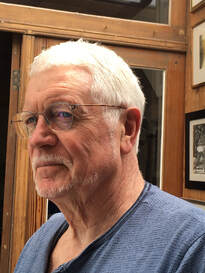 Michael Pettifer has an MA in screenwriting and an Honours degree in Chemistry. He writes flash fiction and short stories and is successful in International flash fiction competitions. Michael was raised near Stratford upon Avon and has a passion for the actors art and live theatre. He enjoys writing short plays for friends. When not writing he is using his word craft as a professionally qualified development specialist advising and supporting others reliant on written documentation and effective communication skills to further their career opportunities. Book Review ~ Jose Varghese You can view the Strands Book Reviews on YouTube now. Here is the review of 'The Seven Moons of Maali Almeida' by Shehan Karunatilaka, the winner of the Booker Prize 2022. This was posted on YouTube a few hours before the prize was declared. Wait for more books reviews here, especially the ones we have already published on YouTube, covering all the books in the Booker shortlist. ~ Short Fiction ~ Rashmi Agrawal First Prize, Strands International Flash Fiction Competition - 15 Mogambo is our code word. Whenever my son, Ansh, digs his nose, my husband says Mogambo. If he bites his nails, we snap Mogambo. If Ansh says a bad word, we don’t tell him not to speak such language. We simply flick our code word. Husband takes care to never yell the word. With all his love, he curbs his disgust and chimes in, his voice singsong. Not to scare the kid but to caution him. Hinting him to keep those fingers in his pockets, not to pick the booger, not roll the muck between his fingers, and definitely not play with it like a tiny pearl between those now-dirty pads of his fingers. Mogambo has been our savior for one year now. Much earlier, when Ansh first pushed his little finger into one of his nostrils and scratched it badly, his nose bled. We explained to him, but our words spiraled down in vain. Ansh was distracted. His eyes slipped at my scratched stomach; I realized it a little too late. So, I bent myself into an arched position, shoulders slouching, my tee-shirt now touching my pajamas, covering every inch of my belly. After bruising the insides of his nose thrice in four months, he developed another new itch. Nail-biting. I was applying the second layer of concealer over the dark bags under my eyes when I noticed it. A red pinprick spot at the corner of his thumb. His cuticles were yet not disfigured, but the ends of his fingers were sore. When he had first bitten them at the corners, we simply told him not to. But we had no choice when he chewed them off to expose the skin under his nails. Keeping eyes on Ansh became our duty, an obligation. Day in, day out. We vigilantly threw him sidelong glances at least a hundred times every day to make sure his fingers stayed where they should. After a few months, we went for a day-long outing and stayed in a resort amid a lush vineyard abundant in red, green, and other grapes. Ansh loved the ambiance and picnicked thrice outside our tent-style room in a green corner. All his meals with nature. Husband and I remained inside the tent, its thick cloth-made door zipped tight. Twice, Ansh had his picnics alone, eating sandwiches, doughnuts, or egg rolls from his picnic basket. The resort was safe and familiar. When I accompanied him during his last round, his eyes searched my face, scanned my arms, then stuck on my lips. I tried to smile. He bit his nails again. I painfully pursed my chapped lips. Later that night, we watched an old Hindi movie that had lots of kids. Ansh enjoyed it until the villain, Mogambo, turned up. His ember eyes, heavy voice, and cachinnation scared him. We never streamed that movie again. And Ansh forgot Mogambo with time. Last year when he turned six, he somehow recalled Mogambo and asked about him. Husband explained: Mothers call Mogambo when kids don’t listen to parents, trouble others, and do pranks that they shouldn’t. Ansh pointedly looked at my left arm. I stretched my sleeve down and then wrapped my arms around myself. He looked scared. So was I. And when his index finger slowly reached inside his nose, my husband whispered Mogambo for the first time. The code word worked. With time, we’ve brought it into our routine, not to scare him but to remind him he is doing something he isn’t supposed to. I murmur Mogambo when he dilly-dallies in muddy puddles, still wearing his white school uniform. He starts walking in a straight line, his fingers entwined around mine. He giggles. Mogambo, I say when he picks out veggies—chunks of tomato, carrot, capsicum—from his food and throws them on the table. He notices the word if I stuff it in a rhyme and smiles with his eyes, aware of my trick. He catches the phrase if I fuse it in a lullaby. Yes, sometimes I sing to him as he has sleeping troubles. I don’t like the word Mogambo when Husband says it. Whenever he needs to say our code word, Ansh has been scared. Ansh doesn’t like it either. If he had picked his nose or bitten his nails, he is scared, more for me than himself. He knows Mogambo is a villain. Today, when Ansh enters our bedroom without a knock, Husband has to pull a sheet around himself. Mogambo, Ansh shouts, his face turns red, and his eyes well up. His fists tighten at his sides, and tears roll down his cheeks. Husband was sure Ansh wouldn’t return from the playground this soon. He didn’t care to lock the door either. Mogambo, Ansh yells again and comes closer. Husband’s belt falls while he dislodges himself from the bed and fumbles with the sheet wrapped around his waist. I wipe my tears, and he quickly exits the room, stumbling over the belt. Mogambo, my son screams loudest ever in seven years. He caresses my cheeks and wipes off the tears on my blemished skin. His not-so-clean fingers move at the blue marks around my neck and then on my arms. It hurts a little. He hands me my robe and tissue from a drawer. I wipe the blood from one side of my mouth. He looks at my bruises one after another. Mogambo, he mumbles while wrapping his arms around my neck. Mogambo is not a villain anymore. It… he is my savior. Mogambo is my safe word now. ~  Rashmi Agrawal lives in India and writes by a big window, enjoying the diverse seasons. Her words are available or forthcoming in Door is a Jar, Roi Fainéant Press, Alien Buddha, Inked in Gray, Dollar Store Magazine, Space City Underground, and others. Her short stories have found pages in various anthologies. She's working on her first novel, a psychological thriller. Nudge her @thrivingwordss. Short Fiction ~ Riham Adly Second Prize, Strands International Flash Fiction Competition - 15 The siren lights from the police car parked outside colored our white-washed living-room with its angel-topped Christmas tree in red and blue. I watched Habiba as she stared at the hysterical woman screaming outside, and for the first time I noticed that our eyes were the same shade of hazel. Habiba watched in panic-stricken silence as the woman’s eyes darted between us. “Which one are you? I want my daughter back!” Mother gripped Habiba’s hands as if to say-you’re safe-you’re not leaving-you’re mine. I waited for her to look at me, but then I knew it, that unfurling truth, like the telling of secret. **** A year ago, back in school, in the locker room a figure emerged like a shadow. “Hi,” She started, singling me out. She had shoulder-length auburn hair, wore a floor-sweeping skirt and a long-sleeved shirt, all in black. It made her look small, infantile, like a lost child in a funeral. “You a nun or something,” someone said, and everyone started laughing. I wore black, too. Mine though didn’t hide as much. “Ignore them.” “I will.” “I’m Ursula.” I flaunted my name like royalty, like I was a better, perhaps more benevolent version of myself. I felt compelled to do so, like someone under a spell. Looking at hair though with those long auburn tresses made the inside of my palm itch and my skin sweat. I was all jumbled-up inside, while she looked solid, all-smiling. “Habiba.” “I had hair like that a long time ago.” I slipped a hand through my cropped hair. “We look alike you and I.” She dared. “No we don’t.” Tiny sparks ran over my neck raising every hair. She stood right next to me. We were the same height. **** “Habiba, benty, come back to me.” Her mother pleaded over and over. Outside the sirens had stopped. The Christmas tree was itself again and our living-room walls turned white — the color of the season. Everyone’s breath turned visible and words mother would utter sometimes like imposter, changeling, not mine crowded my throat. Sheriff Crowley let himself in. “Hilda, this woman outside claims you kidnapped her daughter.” Mother and Habiba’s boots coiled deep in the cold soil outside the house as they watched him take a peek at the ginger bread house and ginger bread men they built together. At the age of twelve I was already attuned to the distance spilling between us all. Daddy had ambitions that turned to ice and melted every year. I had been a good girl for both of them. Mother loved brushing my auburn tresses after her one-sided fights. He took me on hunting, fishing and even mining trips that lasted for weeks leaving her alone. Every year she would build a better and prettier gingerbread house for Christmas. When he left, I ran away after my Daddy. I looked for him in the nearby mines, at the lake, and in the far away woods on the outskirts of town. But he was gone for forever. The day they found me I opened my eyes and found her looking at me. She had eagle eyes, and claws that pulled at me and my hair. She wanted to keep on brushing and brushing till she was all good, but I wasn’t, so I looked for Daddy’s shears and hacked it off. **** When Habiba’s skirts got shorter and her tops tighter everyone at school started staring. “Are you doppelgangers now? That’s just creepy.” Ellen from Chemistry class pitched in, adding a whistle for dramatic effect, her glasses nearly falling off. “We don’t look alike. She has long hair!” It was just plain infuriating. Couldn’t they see? A couple of weeks before Christmas I invited Habiba over to my house. I was drawn to her the way a moth is drawn to flame light. I knew there was much to lose or was it? “Is your mom alright with you staying over?” Mother asked when Habiba came over. “My mother is busy. Would you like to braid my hair?” I saw it happen, the edging in of that withered smile, rekindled hope—a transformation. Mother touched Habiba’s hair with such longing it almost hurt to look at her. “Child, who works on Christmas?” Mother started brushing. “She works to forget. She hardly notices...” And just like that Habiba started telling her story. “We were deep in international waters. Men tried scooping out the water from the boat. My baby sister wouldn’t stop crying. She slipped. Baba jumped. Mama tried to jump but couldn’t and I didn’t jump.” The story ended there. “What do you celebrate then?” Mother didn’t stop brushing. “The Breakfast feast. We eat sugar cookies after the fasting month, but I don’t like them anymore. I’d rather eat gingerbread cookies.” **** I had let my hair grow back in an attempt to win my mother over again, but it was too late. “Habiba, please come back.” Habiba’s mother pleaded before reaching out for my arm. ~ 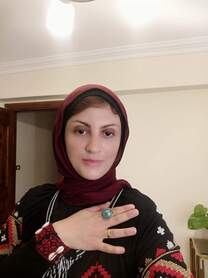 Riham Adly is an award-winning flash fiction writer from Giza, Egypt. In 2013 her story “The Darker Side of the Moon” won the MAKAN award. She is a Best of the NET and a Pushcart Prize nominee. Her work is included in the “Best Micro-fiction 2020” anthology. Her fiction has appeared in over 50 online journals including Flash Back, Bending Genres, New Flash Fiction Review, Flash Frontier and Litro among others. Riham’s flash fiction collection “Love is Make-Believe” was released and published in November 2021 by Clarendon House Publications in the UK. She is the first African, Arab woman to have a flash fiction collection published in English. Short Fiction ~ Eleonora Balsano Third Prize, Strands International Flash Fiction Competition - 15 I am not fast enough, bright enough, pleasing enough. They’ve kicked me out fifteen minutes into my shift. As I walk home, the pin on my name tag biting my leg from inside my pocket, I spot the billboard. Hey student, a debt-free, happy life awaits you. Get a sugar daddy? It says in yellow characters captioning the picture of a young woman looking down to her right, where a gnarled hand touches her collarbone. The insecurity in the question mark unsettles me. Why not an exclamation mark, an infusion of confidence, a solution offered to those desperately looking for it? I call. We’ll put you in touch with one of our clients in a jiffy! Chirps the lady on the phone. An hour later I receive a call from a private number. The voice on the other side is a soft baritone, deep and warm like a knitted scarf. I say I am not a student upfront, in case that’s a deal breaker, but he just murmurs never mind, never mind and chuckles like a doting grandfather from a 1960s sitcom. We agree to meet for tea. He arrives with a drooling bloodhound in tow. I don’t know many old people, so I can’t give him an age. Anything above sixty-five probably. Or more. Or less. I am not sure what age my parents would be now. We have oolong tea and scones, he butters them for me. I wonder whether that’s what sugar daddy means; our first meeting is certainly high in carbohydrates. They drive me home and wave goodbye, the old man and Pluto the dog beside him. We could go to the Luna Park next time, he shouts as I walk away. I hear myself say yes, yes! That night I dream of a large Hello Kitty Mylar balloon flying away from me, towards outer space. In Coney Island, we have pink candy floss and I tell him about the last family, their quirks about food, how I stashed it under the bathroom sink in case they locked the cupboards. Am I oversharing? I ask him on the Ferris wheel. There’s candy floss in the sky! He replies. His eyes are shining. On our third appointment, the old man offers to cook for me. I climb the stairs to his apartment and as the door opens, I gasp. A giant Mickey Mouse is bobbing his head at me. ‘Hey everybody, it’s me! Do you want to come to my Club House?’ Mickey says, clapping his yellow-gloved hands. The old man is trapped inside, like a fly in a jar. We have a Mickey lunch of hot dog, hot dog, hot diggity dog that we share with Pluto, then the old man shows me around his house. Every room has a theme: his bedroom is a triumph of Minnie Mouses and Mickeys holding hands, the spare bedroom is filled with Donald gadgets, and the bathroom is decorated with red ribbons and black mouse ears. Do you like it? He asks, taking off his Mickey head. He’s red and sweaty underneath. I say it’s extraordinary, which in a sense is true. The old man has four children and eight grandchildren, but he hasn’t seen them in a decade. He can’t remember why. There’re many reasons and then none, he says, staring at his Mickey patent black shoes. There never is one reason, I say. There’s always one too many, he says. We lie down on the Scrooge-themed carpet and stare at the ceiling, covered in glow-in-the-dark stars. Will you find them when it’s time? He says. When..? He turns toward me and pulls down his collar. There’s a lump on the right side of his chest. A chemo port, he explains. I say I will tell them about this place. A few weeks after that, I find a new job at a bookshop. I still make almond lattes and soy cappuccinos for a living, but when there are no clients, I can leaf through the books. The old man and Pluto come by every Wednesday and wait for my shift to end. I walk them home and sometimes bake a Grandma Duck apple pie for them. He doesn’t wear the Mickey costume anymore but he keeps a pair of ears by his bed. One night the police call and say the old man is dead. The neighbors called 911 because of the putrid smell next door and they found him on his bed with Pluto at his feet, both looking like they had been asleep a very long time. He’d left my number beside the ears. I wear his Mickey costume to the funeral. His children and grandchildren look like they’ve never tasted hot diggity dogs. He loved you very much, I tell them through my Mickey grin. Then I waddle away, towards the light outside. ~  Eleonora Balsano is an Italian-born writer living in Brussels, E. U. Her short fiction has appeared on Fictive Dream, Reflex Fiction, Bandit Fiction, Ellipsis Zine, Retreat West, Twin Pies Lit and elsewhere. Eleonora is working on a novel and is represented by Zeitgeist Agency. Tweets @norami. eleonorabalsano.net Short Fiction ~ Claire Schön Honourable Mention, Strands International Flash Fiction Competition - 15 A sharp slap across both cheeks. My mottled flesh draws tight as salty moisture descends along the crease of my nose before leaping with the wind to be carried to its sea-air counterpart. Air that has kept me alive all my life, now waning. The seagulls guffaw, swoop and sail on each gust, either ignorant of what is about to pass or not accepting, as I was. The ocean calls from the pier, tempting me to ride this out in the waves of my childhood. A crust of foam crashes against the warped and weathered wood. I could slip, sweep away, but my life is no longer my own to decide. * One small, black, metal box each: a door to close in this world and open in the next. Sam selects quickly, placing his very first teddy bear next to the box. Silence. We don’t say that he could take many smaller items in place of this large one; we don’t ask him if he would prefer something to play with, something more his age – we don’t dare. None of us knows what the other is thinking anymore. But we know why he doesn’t place Mr Squeeze inside yet: he needs him more than ever, right up to the final day. Emily chooses daily, then changes her mind. Her earnest little face pains me, but I worry about her the least: she has less to forget, less to compare. Graham hasn’t mentioned his box. It’s probably filled with practical items. We’re grateful for his pragmatism: for his job, for our chance. Graham frowns at my selection. ‘The Elite,’ he spits, and, for once, I feel his dislike is genuine and not just for my benefit, ‘took too much. They’re finding it hard to settle.’ I empty my box again. What I will miss I cannot take with me: a child’s fresh, moist and earthy smell when they come in from outside, walks down my memory lanes of the seaside, other people like us. The Elite’s money hasn’t yet stretched to include everything nor everyone. * Emily closes her box; Sam hugs Mr Squeeze one last time. Graham’s box is already on site. I take mine, still empty, and place it in the boot with the lid open. I carry Mog to old Mrs Jeffries, I haven't asked her yet, but she takes her from my arms before I have the chance to speak or give Mog one last stroke, probably for the best. I admire the fickleness of my feline companion of the last five years. I place a shopping bag full of cat food just inside Mrs Jeffries’ door. A gong-like tone resounds as the tins clang against Mog’s favourite metal bowl. Mrs Jeffries looks up from her newfound furry companion and squeezes my hand; her eyes smile with forgiveness. My temples throb, deep, heavy and full of blame. We stare back at our house from the car as the Radley’s open their door. The children run to each other, chattering away like it’s any other day. Jill and Adam walk forward and pull us both close. We stand as one, for a moment, nothing and everything between us. When they let go, we can’t utter a word. What do you say when it is the last time, when it is unfair, when our children have a future, but their children won't? Who would have thought our career choices would weigh so heavily in our lives. The throbbing eases as the tears stream down my face forming a pool under my chin and dropping at regular intervals, counting down. I hand Jill our key. ‘I’m sorry,’ I sob. While Graham straps the children in, I open the boot. I grab handfuls of earth from our garden, from the grass verge outside, digging in repeatedly. My fingers burn, and I feel my nails break away from the tender connecting skin between. I kneel to dig deeper, wanting to bury myself here on this spot. I don’t stop until my box is full. I snap it shut. A smattering of earth falls from my hands onto the lid as I lower it down. We are born of the earth and should return to it when we die. Only we won’t. Graham takes my filthy hands and leads me to the passenger seat. We both know they won’t let me keep the contents of my box. Graham says nothing, and I’m grateful. I call my mum one last time from the car. ‘I love you, baby girl, kiss the small ones for me – every day.’ I hear her voice catch as she hangs up. ‘From Nanny,’ I say, turning and pecking each of their cheeks lightly, knowing that I cannot manage the big, wet smacker of a kiss my mum had intended. ‘Will we still all go to the same heaven, Mummy, with all of the people from here when we die?’ I answer that we will. I spend the rest of the journey praying to God, although I am no longer sure he is listening, that this may be true. We enter the Dome: our home for the preparation stage until we embark on our one-way journey. My dirty hands, tear-streaked, mud-smeared face, and grass-stained knees do not warrant a comment from the security staff. They don’t decline me. I am sure they have seen stranger – worse. I pick at the residual soil while we wait, smearing it in peaks resembling waves across the backs of my hands. Emily sleeps, lightly snoring a soothing whooshing sound, and Sam cuddles into her, a surrogate for Mr Squeeze. I know, with a certainty that I’m deeply ashamed of, that I would not be going through with this were it not for them. I would take my last breath, my last everything, here for as long as possible. * Sanitised, we enter our compartment. The children explore. I stare, bereft, at my washed hands. ~  Originally from the UK, Claire Schön now lives in Austria. She studied German and Spanish and is fluent in the former but useless in the latter. Claire started writing in her mother tongue in 2020 and has stories published or upcoming in a number of online and print anthologies including Reflex Fiction, Idle Ink, Funny Pearls, Fudoki Magazine, Blinkpot and Grindstone Literary. She won the Shooter Flash monthly competition at the start of 2022 and has been shortlisted and longlisted in various international competitions. Claire is currently working on her first novel. Claire tweets now and then @SchonClaire. Short Fiction ~ Richard Garcka Honourable Mention, Strands International Flash Fiction Competition - 15 That’s decided, Sam thinks. I’m semi-naked for the team videocall. A logical progression. Last Friday, he wore his cricket pads. Yesterday, it was his ex-wife’s wraparound skirt. Cross-dressing is not his thing, though he did find the experience strangely liberating. OK. As acts of rebellion go, inappropriate out-of-shot clothing is not exactly The Storming of the Bastille. What’s more, he can disable the webcam if necessary, so the risk of discovery is low. Yet, he finds the idea tantalising. What the hell. He reaches down, slips off his pyjama bottoms and lets the morning breeze from the open window do its worst. The call is as mind-numbingly dull as normal. “Right, let’s kick the tyres on this sales pipeline. I want to move the dial on those quick wins.” declares his boss, Matty, murdering metaphors with his customary relish. Sam slumps, mentally switches off and lets his mind wander. He imagines himself in the Caribbean. Bowling slow right-arm leg-breaks to the West Indies openers. The oppressive heat. The crowd barracking. His captain urging him on. Then, trying the off-break. The “wrong’un”. The classic Googly. Ball onto pad. That’s LBW surely. The whole team appeals. “Howzaaaaat!” screams Sam, leaping to his feet arms outstretched, eyes squeezed shut and mouth agape. Silence, then… “Love it! Bloody love it, Sammy-boy! Showing some real cajones there. Love it!” Sam shrieks, drops both hands protectively, then collapses into his chair, which skids backwards before clunking into a cupboard. He stares aghast at his image on the monitor, still in full view. His team are all applauding. Matty punching the air. Sliding slowly to the floor, he crawls on all fours out of shot, cheers ringing out of the speakers. Sam curls up in the corner, hugging his knees, face aflame. Trousers next time. That’s decided. ~  Richard Garcka is relatively new to writing. Following Creative Writing classes, his short fiction over the past couple of years has been published by Arts Quarter Books, Cranked Anvil, AudioArcadia and Spellbinder magazine, along with several other commendations. Short Fiction ~ Stephen Smythe Honourable Mention, Strands International Flash Fiction Competition - 15 It isn’t a redeployment interview, the letter says, it is a facilitated conversation. I’m at a small round table in a focus pod with a smiling Jasbir from HR and a stony-faced consultant whose name I’ve already forgotten. It’s my first time in this construction from another planet, cylindrical with clear sliding doors. Outside are banks of hot desks occupied by strangers staring at screens. The Council’s Transformation Team gutted the Victorian Town Hall for this soulless open-plan vision. A lad with short hair and a long beard looks up from his laptop and into the pod. I catch his eye and he turns away quickly. ‘Are you okay?’ Jasbir says. I nod even though it’s like I’m on show. ‘The pods are soundproof,’ she says. They’re also airless, sealing in the stench of the consultant’s cologne. I run my finger around the inside of my shirt collar and loosen my tie. When I pour myself some water my hand trembles and I spill a little on the table. ‘Sorry.’ The consultant, whose navy suit must have cost more than I get paid in a month, doesn’t blink. I pat my jacket pocket but can’t find a tissue to mop up the water. ‘Well, here we all are, Ged,’ Jasbir says, brightly. ‘You’ve been with the Council a while.’ ‘Since I left school.’ She checks her tablet. ‘Thirty-four years. Print manager for twenty!’ I’ve always liked Jasbir, but now she sounds like one of them. ‘Today is about matching your skill-set with current vacancies across the organisation.’ ‘In line with the Council Values,’ the consultant adds flatly. Jasbir smiles. ‘Of course, the Values.’ People … Performance … Passion … damn, what’s the fourth P? I hope they don’t ask. ‘We’ve identified a team leader position in Business Support for you,’ Jasbir says, wide-eyed, like she’s offering me a promotion instead of a wage cut. ‘Team leader? I’m a print manager!’ With a mortgage on my flat, child support for twin seventeen-year-olds, and monthly maintenance payments to my ex. I shouldn’t have to be starting all over again, not at fifty-one. ‘There is no print manager anymore,’ the consultant says. ‘The post has been dis-established, as you well know.’ ‘They shouldn’t have got rid of the Print Service. It’s not fair. People–’ ‘There is still a Print Service.’ the consultant says. ‘It’s being driven by Procurement.’ ‘What do they know about printing?’ ‘The Council decided it’s no longer cost-effective to keep the Print Service in-house.’ ‘That’s because they didn’t invest–’ The consultant holds up his hand, the strip light catching his gold cufflink. ‘The Council gave everybody the opportunity to comment on the restructure proposals.’ ‘I did comment. Nobody was listening!’ Outside, several heads jerk up. So much for the pod being soundproof. ‘Sorry. I’m … ’ ‘It’s a stressful time for everyone,’ Jasbir says. ‘Printing’s all I’ve ever known.’ ‘Try to look at this as a new opportunity,’ the consultant says. ‘The Council doesn’t want to make staff redundant. A good thing, right?’ I nod. ‘However, in return, you must demonstrate the required flexibility and move to where the business needs you.’ ‘Business? This is the public sector.’ ‘The Council requires people who are prepared to come along on its journey.’ ‘It really is a good fit for you, Ged,’ Jasbir says. ‘The team leader position.’ I sigh. ‘Where is it, again?’ ‘Business Support.’ ‘You mean Admin?’ ‘It’s not called that anymore,’ the consultant says. ‘You’ll be part of Raymond Hope’s team,’ Jasbir says. Raymond Hope. When I was print foreman, he was a cocky kid in the mailroom. He’s still full of himself. ‘Is there nothing else?’ Jasbir squints at her tablet. I hold my breath. She shakes her head. ‘Afraid not.’ ‘This team leader post – I don’t have to take it, do I?’ ‘I’d encourage you to give it serious consideration, Ged.’ ‘The letter said I’d get two job offers.’ ‘Up to two job offers,’ the consultant says. ‘What if I don’t like either of them?’ ‘That’s your choice,’ the consultant says. ‘The terms of redundancy are fair.’ This past six weeks, since I heard the Council’s plans, I’ve contacted every printer I know and all their suppliers. Plenty of sympathy but nobody’s hiring. They’ve let me keep my office for the time being while I work with Lena, an enthusiastic project manager from Procurement, preparing the printing tender documents: helping to sell off the thing I love. Lena says she’s expecting companies from across Europe to bid. When I was an apprentice, my old boss Mr Riley wouldn’t use any supplier more than ten miles away. Last night I walked the shop floor before locking up. Sheila my secretary, Rita the office manager, Jim, Annie and Levi the printers, Pete and Maggie the finishers, Del the driver, Tony and Anita the job estimators, have all gone. My footsteps echoed where once the presses roared. Along the aisles the kit was draped in ink-stained dust sheets: the old Heidelberg I’d sweated to breaking point, the guillotine blunted for the last time. ‘Ged? Jasbir says. ‘Ged?’ The water I’d spilled is still on the table. ‘They promised me a six-colour Speedmaster.’ My voice thickens. ‘Sixteen thousand sheets an hour.’ Jasbir fingers flash on her tablet. ‘I’m sending you a link to the Business Support team leader job description.’ Pride. The fourth P. They didn’t even ask me. The consultant stands. ‘Looks like we’re done.’ While Jasbir puts her tablet away, I look at my watch although I’m in no rush. I examine the back of my hand with its deep blue veins. There is ink running through them. ~ 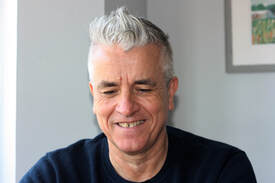 Stephen Smythe lives in Manchester, England. He achieved an MA in Creative Writing at Salford University in 2018. His flash fiction was shortlisted for The Bridport Prize in 2017 and longlisted in the Bath Flash Fiction Award, 2018. He was runner up for his micro fiction in the Bangor Literary Journal FORTY WORDS competition in 2019 and this year in the same competition his story was Highly Commended. In 2020, he had poems shortlisted and longlisted in The Eighth Annual Bangor Poetry Competition and his five minute play 'Mr Bombastic' was shortlisted in the Todmorden Book Festival Play and a Pint Competition (performance and result held over to 2021). His story 'Granny' received an Honourable Mention in The Strand International Flash Fiction competition -9. Short Fiction ~ Venkataramanan Ganesan Honourable Mention, Strands International Flash Fiction Competition - 15 A moon completely swallowed by the night sky lent a more ominous feel to the river than what was otherwise warranted. Jet black. Dark. Deep. Brooding. It was like staring into an abyss. A vast expanse of nothingness. If you were to thrust out a hand in front of you, you wouldn’t be able to spot it. The dozen people sitting waist-to-waist in the cramped confines of the rickety boat were as blind as bats. The wheezy whirring and sputtering of the complaining outboard motor was an exercise in unavoidable monotony. On a clear night, the foaming trails of white left in the wake of the swathe cut by the boat would be clearly visible. But tonight was neither clear nor usual. A chill breeze cutting across both the river as well as the worn out life vests made the tourists shiver and horripilate. “The most essential requirement of this tour is silence”, drawled the lean and cadaverous tour guide as an excited bunch of tourists formed a half circle around him in the briefing room twenty odd minutes before the actual boat ride. An unlit cigarette hung precariously from a corner of his mouth. Lit by a single dull bulb, the room had a musty and damp odour to it. Paint peeled off the walls creating random and cartographical patterns similar to that made by spontaneously formed archipelagos. A table with fine layers of dust had arrayed on them in no logical order a few brochures advertising the resort’s old glory days. The Government had more pressing priorities warranting attention, and subsidizing a once thriving “firefly park” resort was definitely not one of them. “Please do not scream or wave and most importantly do not get up from your seats. The motor would be cut by the captain, and the boat needs to be steady and balanced. No flash cameras or video. Sometimes a curious firefly may make its way into the boat and may even alight on your person. Please do not touch it.” Taking a wide berth, the boat rounded a bend and the captain manning the conveyance cut off the motor. A collective gasp escaped the mouths of the tourists. The foreboding veil of darkness was pierced by millions of miniature pin pricks of light. A small copse abutted both sides of the boat. Perched on every thicket and clump and darting between irregularly spaced trees were an uncountable number of fireflies. Tiny scatter shots of magnificent resplendence. Infinite specks of joyous light. Microscopic bursts of lambent glow. The largest firefly is about 1 inch long and is diurnal. Fireflies emit a chemically produced "cold light" from their lower abdomen. This light is either yellow, green, or pale red, with wavelengths from 510 to 670 nanometers. The iridescent glow is a paean to the most primaeval urge to which every animate being is unwittingly subservient – the satisfaction of carnal pleasure. The luminance emitters are egregious males enthusiastically trying to get the attention of their feminine counterparts. This biological intricacy was completely irrelevant for the astounded gang sitting poleaxed in the boat. The biting chill ceased to be an impertinence. A surreal sense of existential bliss enveloped the tourists as some quivering fingers shot out in various directions, while a few palms cupped around mouths gaping wide in a display of unabashed incredulity. There was a stony yet welcoming quiet all around. Fireflies flutter their wings, but their minuscule size means that unless such fluttering takes place very close to one’s ear, no perceivable sound is heard. Just as the less than avuncular tour guide had proposed, a few intrepid fireflies came wafting into the boat and settled themselves at various points. A few perched on the sturdy ropes laid across the floor for mooring purposes, while some rested on the transparent glass door that separated the captain’s compact cabin from the passenger seating. An obese youth, unable to contain his delight, leapt up, and letting out an uncontained yell of delight put out his arm in an attempt to grab at a firefly. As ill-luck and fate would contrive, at that exact moment, influenced by high tide a restless crest swelled just underneath the boat, which in an undulating pattern lolled and tilted to one side. Losing his balance, the boy teetered over the edge of the boat for a few fleeting seconds before dropping into the water. A heavy tonk or a thump akin to that generated when a boulder is plonked into the water emanated instead of the usual splash. Propelled by sheer maternal instinct, the boy’s mother lunged after him into the river. The Captain by now an apoplectic wreck dove into the water. Absolute pandemonium squeezed the boat in a vice-like grip. The glittering spectacle of fireflies was relegated to the confines of nature. A hysterical set of Homo Sapiens lamented, cursed, cried, and shivered. A sprightly young lady fainted and collapsed on the hard surface of the boat, cutting open her forehead in the process. Mobile signals in such geographies constitute a futile wish. The malfunctioning wireless in the boat was long discarded. The only logical hope was the satellite phone in the briefing room. The room’s occupant was currently gasping for breath in the ice cold waters. In their frenetic bid to stay alive, and in a fit of absolute delirium, both mother and son unfastened their life vests in a bid to tighten them. Now they were sinking fast and taking their potential saviour along with them. There was stillness as the river swallowed the three thrashing souls. But after a few agonizing hours as the remaining people onboard were left benumbed from the shock, the water spat out the drowned figures and they bobbed towards the surface. Curious fireflies flew from all directions, and surrounded the bodies. When rescuers alerted by a worried spouse of a tourist on the boat finally arrived, the floating and bloating corpses looked as though they were encircled by electric wreathes. ~ 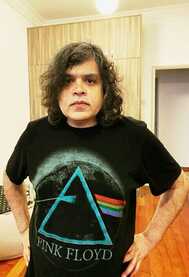 Venkataraman Ganesan is a Chartered Accountant by accident and a lawyer by intent. He has a maniacal penchant for books, more books, still more books and a lot more books. He is a cricket (not the insect) tragic who loves his Scotch & scribbles for fun. He maintains a blog www.blogternator.com, which his own mother steadfastly refuses to read, even when bribed. Short Fiction ~ Oscar Windsor-Smith First Prize, Strands International Flash Fiction Competition - 14 He was levelling a floor of quick-drying cement when the sounds burst in through the open front door. A screech. A thump. A vehicle stopped, engine ticking, and then moved on. By the time he’d hobbled to the scene the killer had gone. The cat lay lifeless in the road. There was no blood, only unnatural stillness and amazing clarity in frozen eyes. Oblivious to listeners or echoes from uncaring walls; aware only of incomprehensible loss, at last Richard screamed. They’d met a year ago, he and the black and white cat, soon after Beatrice entered the hospice for the final time. They must have shared some similarity of spirit, because the cat – a rag-tag bruiser bearing countless scars from living wild – had rushed to Richard and he had welcomed the cat like old friends reunited. He’d named his new friend Buster. Richard’s spade sliced through firm turf, glided deep through loamy earth to clay and clinked on flint, to create a decent resting-place. He laid the still-warm body on a fresh white towel embroidered at one corner with a heart in red silk. Swaddling the soft material tight around Buster, he lifted the cat to his chest and then lowered him into the earth. All too aware of racing time, Richard swiftly refilled the grave. He took care though over levelling the earth and cleared away all trace of spoil; the way Beatrice would have liked. The way she would have liked. Strange, how he felt able now to face that thought. Kneeling again, steel trowel in whitened fist, Richard’s arm swept back and forth, levelling and correcting, smoothing and re-smoothing the tiny craters that kept appearing in the surface. Later, dry-eyed and exhausted, the floor perfect, Richard closed the door and plodded up the echoing stairs to collapse into their double bed and twilight thoughts of Beatrice. Fresh as the evening breeze she’d stood, flower print dress fluttering, body swaying to music on a scratchy record booming from speakers in the church hall. Unaware that Richard was standing in shadow she’d bent forward to something out of his line of sight, speaking soft words he could not make out. Intrigued he’d moved into the light. She’d started, unbent and revealed the object of her attention: a black and white cat. 'Oh! You made me jump,' she said. 'You had me worried, talking to yourself.' ‘I was talking to the cat,' she said, indicating where the animal had been. 'I see no cat,’ he’d replied. ‘But I'd like to take your picture.' Was that really how they’d met or could this be another cruel trick of his aging brain? Photography had been his hobby back in the day when she had written poetry. If the memory was true he must have that picture somewhere. Awake now, Richard got up and searched every cupboard, every album and every corner of the cottage. Hours later, defeated, he collapsed back in bed. Sleeping fitfully, he saw Beatrice again, sitting beside him in their living room, a cat on her lap, another at her feet. 'Perhaps all cats were human once,’ she said, ‘who knows what happens to the souls of the dead?' ‘Perhaps,’ he replied without conviction. 'You should try smiling at them,' she said. 'Smile and watch their eyes. Once you have their trust, they'll smile back.' 'Feline faces don’t have the muscles to smile,' he argued. 'I don't know about that,' she said, 'but smile they do, you take my word.' He had tried smiling at cats, when he’d thought Beatrice wasn't looking, but he’d never received the shadow of a smile in return, or indeed the courtesy of any response at all for his trouble. Not until Buster. Richard awoke to dawn light sidling down the bedroom wall. He eased his aching back off the bed and shuffled downstairs. The door was ajar although he was certain he had shut it. Inside something wasn't right. There were marks in the dry cement; a line of small dents in his smooth floor, a cat's paw prints, heading toward a closed cupboard door. Richard tested the sole of his slipper on the new surface. Satisfied, he tiptoed forward and opened the door. The cupboard was empty except for old lining paper but fragrant with perfume that was Beatrice. He lifted the lining paper and drew it to his face, inhaling memories of the girl in the flower print dress. Something fluttered to the floor. Through cloudy eyes he saw an envelope lying on the fresh cement. Richard picked it up, heart thumping, raised the flap and discovered two photographs cradled within a fold of pink notepaper. The first image recorded Beatrice standing, laughing, in the church hall doorway. The second he could not recall having taken; in fact, he felt quite sure he had not. But there, in the same church hall doorway, close up and centre frame, sat a large black and white cat. And it was smiling. In the white margin of the second photograph someone had written the words ‘Turn me over’ in blue ink. On the reverse, in the same ink and Beatrice’s distinctive hand, he read: Please don’t break your heart Endless time is on our side Our love has nine lives ~ 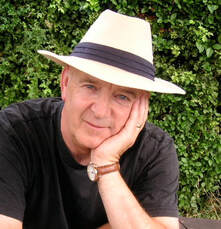 Oscar Windsor-Smith is an English writer from Merseyside, now resident in south Hertfordshire, UK, with fiction and non-fiction prose and a smattering of poetry published in diverse places, in print and online. His short fiction has appeared in a number of anthologies, most recently in the Departures anthology from Arachne Press. He graduated from the 4-year BA creative writing course at Birkbeck, University of London, in 2018, having specialised in screenwriting, but is returning to his first love, short and flash fiction. Short Fiction ~ Hannah Mitchell Second Prize, Strands International Flash Fiction Competition - 14 Eileen’s 83rd birthday was three days ago. She celebrated it the same way she celebrated the last eight birthdays: by buying an iced bun from the bakers opposite and sitting on the bench by the pond to watch the ducklings swim behind their mamas. She threw the crumbs as far as she could despite her arthritis and, in turn, they chattered their bills and crowded her for more. She reached in her handbag for the bag of frozen peas. Eileen decided to stay by the pond awhile before visiting Johnny and then sitting by the television alone that night to watch Alexander Bradley referee the Quizzers against the Einsteins. Johnny was Eileen’s husband and he was not dead. He lay in an institution, unblinking, his skin turning greyer day by day. Eileen visited him every day. But the only memory he had of her was when he looked at the black and white photograph of the two of them and murmured “they look happy”. And, every time, she would pat his withering hand and say “they are”. The nurse knew Eileen as a regular and escorted her in and out and greeted her by name. Over tea, Eileen would tell her the stories of Johnny and their marriage, as much as she could listen to, before leaving her alone with Johnny to take care of the other patients. From across the pond, Eileen saw a pair of lovers, two young men, holding each other. They noticed her watching and ducked their heads. She wasn’t offended; she was saddened. The world still wasn’t there yet. She remembered her brother, Jacob, and finding letters from his lover after he died. Eileen’s mother had told everyone that Jacob was killed in action; Eileen knew he put a bullet through his head in the trenches. The diagnosis was shellshock but in those letters to Frederick, she knew that he couldn’t live with himself, in this cold world, where men like him were tortured and imprisoned. Frederick mourned for years over the man he could never marry. Jacob wrote how he wished for a better time, a utopia, where he could love his sweetheart, even if that world was Beyond. Eileen grew close to Freddy, he even proposed, but she accepted Johnny instead. They adored Freddy like a brother and, when he died in the 80s, Eileen wondered if he was reunited with Jacob and if they were happy and free now in the Beyond. Johnny had said “They are.” Eileen glanced at the young couple, who were still smiling and kissing, despite the world around them. She smiled at their bravery and adoration. She wanted to talk to them, offer her help to them, but couldn’t bear to break their hands apart for even a second like Jacob’s and Frederick’s had been. So, she reassured herself. In addition to all else she mumbled to herself, Eileen, over the next three days, kept muttering to Jacob “Are they happy even though the world isn’t there yet?” and she thought Jacob would answer, “They are”. Before her solitary birthday dinner, Eileen went to visit Johnny. As usual the young nurse greeted her. She told both the nurse and Johnny about the bun, the ducks, the young couple, about Freddy and Jacob. Johnny stared at the ceiling the whole time then turned his head to the photograph. In his toothless slur, he said “They look happy.” Eileen squeezed his fingers. “They are.” Three days after Eileen’s birthday, Johnny was dead. The photograph was shattered and his hand was resting on the table as if he had reached for it in his final breaths. Eileen watched him being carted out of the institution, solemn, knowing that no one was left for her now. Her thoughts strayed to arthritis medication and her bed and her empty mantlepiece. She thought about how tired she was, how she needed a good, long sleep. She was so tired she could have slept forever. So, Eileen walked home. When two nurses cleared Johnny’s room, they carefully picked up the photograph. They stared at it for quite some time, staring at the two young, happy people in their little, monochrome world. “Wow, I wish I could love someone like that one day. They look really happy.” “Yes,” said the nurse. “They were.” ~  Hannah Mitchell: I currently study English with Creative Writing (BA) at Leicester University. Although I have dreamed of being a writer for many years and have written for my own enjoyment, this is my first publication. It’s an honour for Strands Publishers to give me my first step into the writing world and I hope there’s more to come. Short Fiction ~ Michael Pettifer Third Prize, Strands International Flash Fiction Competition - 14 The Spiders’ International AGM over, Webster, Scooter – our American delegates - and I discuss the meeting and life in general. It had been a mundane annual bash though later in the year than normal due to the subtle yet profound environment changes that directly impacted our spider season. (I’m one of those small spiders that love spinning near trees, outside tables or umbrellas and other places that let me explore my creative options to spin my webs.) Webster, never a chatty one, looked at Scooter who was sounding forth on those that had no idea of a spiders worth. ‘I mean, they just swat you away,’ said Scooter. ‘Tread on us or destroy our food source with the swipe of a brush. No respect or understanding for little things.’ Webster nodded in agreement and then shot a gossamer thread from a tree leaf into the breeze. He swung there, back and forth with a smile as he embraced natures free gift of wind. Then he said: ‘You know Scooter, last week they came out with a water hose and blasted anything that looked web like in and around my terrace area. They missed my spot, I was there in the small hedge catching anything trying to fly through. They left the hedge alone. I just watched in horror as Blue, Parker and Jello got washed down the drain.’ ‘Genocide, that’s what I call it,’ said Scooter. ‘Then they whinge about bugs, bites and why their veg. is being destroyed.’ ‘Veg...tomatoes?’ said Webster. ‘Exactly,’ said Scooter. I take a more nuanced view on things these days. They seem to have grasped the fact that nature offers free energy sources that can drive turbines and mills. Of course they also discover other truths about nature but then tend to shrug it off and quickly move on. ‘ You know,’ said Scooter. ‘They sometimes stop and notice the sun on our gossamer threads and the light blues, electric blues and other colours and just for a split second appreciate the skill in us being able to produce these wonders. Then, as if possessed by some demon, with a swipe of their hand our handiwork is destroyed.’ ‘Terrible,’ said Webster. ‘Exactly,’ said Scooter. Their comments made me think about the annual prizes given out at this year’s AGM. All the usual ones of course: Most beautiful web – that prize went to Muffet for the second year running – oh the symmetry - breath-taking. The longest gossamer thread went to Hunter – an unbelievable 3 metres long, and the colours! The best disguised web home went to Sonic who spent all season hidden behind the wing mirror of a BMW X4 – what a hoot! And the best story Web Sight went to Digger (...jeux de mots of course...he’s our English spider ... the English always have been good at spin.) For me, I keep myself to myself these days. And though I sympathise with Webster and Scooter – both of whom get so wound up about things, I’m a bit more philosophical about life and them. I mean they never have had much time for things they cannot sell or commercialise and even less time for barely visible creatures that keep eco. systems ticking over. We all hope of course, I hope, but they are very much of a NIMBY or ‘that’s not my problem’ mentality. I think what hurts most is when one of us is trod on or they smash us with some sort of ‘swat.’ I mean vacuum cleaners are an occupational hazard, but deliberate destruction of my co-spiders is of a different dimension. Is a spiders’ life so cheap? Is my life worth nothing being regarded as a pest subject to a house cleaning exercise and nothing else? Well, having put the world to right, Webster and Scooter departed and I made my way back to my secret web. The wind had picked up but my gossamer mesh held firm pulsing with the ebb and flow of the wind. Fortunately the breeze had secured my dinner and, by the look of it, breakfast as well. I wonder if my web will still be here tomorrow. ~ 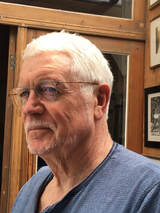 Michael Pettifer has an MA in screenwriting and an Honours degree in Chemistry. He writes flash fiction and short stories and is successful in International flash fiction competitions. Michael was raised near Stratford upon Avon and has a passion for the actors art and live theatre. He enjoys writing short plays for friends. When not writing he is using his word craft as a professionally qualified development specialist advising and supporting others reliant on written documentation and effective communication skills to further their career opportunities. Short Fiction ~ Judith Segal Honourable Mention, Strands International Flash Fiction Competition - 14 I come out of Harvey’s Ladies’ Fashion Emporium feeling very pleased with myself. One raincoat, two cardigans and two skirts, all half-price. In my jubilation, I almost trip over the young girl squatting in the doorway, sheltering from the rain. I’m afraid to say beggars are a common sight in our town. Rumour has it they come down from London drawn by the potential for rich pickings in our High Street. I bend over the girl. ‘Would you like a sandwich? Or perhaps a coffee?’ I know you’re not supposed to give beggars money since they’ll only spend it on drugs. She looks up at me, startled. My heart melts. She’s only young, late teens at most, the same age as my Catherine. She’s thin, painfully so, arms like – like matchsticks, and, I’m afraid to say, she smells. It’s clear neither she nor her clothes have been near cleaning products for some time. ‘No, thank you,’ she says in an accent I can’t place. ‘Is it very busy in there?’ She nods towards the shop. ‘Not very,’ I reply. ‘There isn’t much left on the sale rails. Most of the best stuff has gone.’ ‘Might as well try somewhere else,’ she says, attempting to get up onto her feet and failing. I take her arm to help her and am shocked by how weak she is. ‘That’s what comes of not eating properly,’ I say sternly. It’s what I used to tell Catherine when, aged thirteen, she’d bemoan her acne. She’d refuse my healthy, home-cooked supper and then gobble up a whole packet of biscuits. ‘It’s hard to find proper food,’ the girl says, holding onto my arm and straightening herself up with difficulty. I refrain from reminding her of the proffered sandwich, and ask her her name. She mumbles something which I have to request her to repeat. ‘Angrita!’ I say, impressed. ‘Never heard that one before.’ I suppose her parents couldn’t decide between Angela with a hard g and Rita, and compromised by combining the two. ‘Now, where do you want to go?’ ‘Where else has a sale?’ asks Angrita, still holding onto my arm. ‘Plenty of places. But what do you want to buy?’ She looks at me as though I’d asked her if she wanted to go to Timbuktu. I begin to wonder whether she’s all there or whether her brain has been fried. Catherine tells me it’s common knowledge among the local youth that amphetamines are freely available in the Town Hall car park and crack cocaine is sold openly on the steps behind the Baptist Church. Not, she hastens to assure me, that she’s ever had anything to do with either. ‘I don’t want to buy anything,’ Angrita replies. ‘It’s just that people get angry at sales. They find the exact dress they’ve always wanted at twenty pounds off but it’s a size too small, or the person in front of them buys the last half-price microwave.’ A woman bursts out of Harvey’s, sees the rain driving in horizontal spears and fumbles in her carrier bag for an umbrella. ‘Bloody weather,’ she says to us. ‘In August. And it’s so cold as well. I blame all those bloody vegans for having jackfruit jetted in from Java. All those carbon dioxide emissions. Why can’t they be happy with marrows like the rest of us?’ Angrita smiles sweetly at her. ‘I suppose it takes all sorts,’ says the woman, softening. She unfurls her umbrella. ‘The rain will please the gardeners at least.’ She marches off, holding the umbrella in front of her like a battering ram. ‘I feel a bit better now,’ says Angrita. ‘Oh bother, here comes that crazy vegan lady. Let’s duck round this corner.’ “That crazy vegan lady” is a fixture around our town, parading placards bearing slogans such as “Only Zombies Eat Flesh”. She arouses a lot of negative comments in local face-book pages by her habit of standing outside primary schools brandishing toy woolly baa-lambs and demanding to know of five-year olds why they eat such things. ‘What do you have against the crazy vegan lady?’ I ask Angrita, following her round the corner. ‘She’s just too angry for me,’ says Angrita. ‘Too much anger makes me ill.’ Oh dear, I think. Could this be another symptom of a fried brain? I peep round the corner. ‘The vegan lady’s gone,’ I say. ‘SavePlenty has just opened a new butchery counter. I suppose she must be hovering outside, laying curses on all who enter.’ We emerge back onto the High Street. Suddenly Angrita grips my arm. ‘What’s that noise?’ she asks. ‘It sounds like people marching.’ ‘That must be the People’s Park demonstration.’ I explain that the council have decided to make the little park next to the river into a wildflower meadow. Save on the cost of gardeners. A few sheep should keep the grass down. ‘Conservation and cost savings,’ says Angrita. ‘What a good idea.’ ‘The good people of our town don’t think so,’ I say. ‘They want a polite park with regimented rows of geraniums bordered by lobelia, and perhaps a couple of well-behaved ducks on a pond. Somewhere nice where they can eat their sandwiches.’ ‘Can’t they do that in a wildflower meadow?’ ‘No. Sheep pellets. Bees. Miscellaneous creepy-crawlies.’ The noise of people protesting grows louder, and then there they are, coming over the brow of the hill at the top of the High Street and threatening to engulf us. They are waving banners and shouting slogans. “Save our Salvias!”, “Protect our Petunias!” The crazy vegan lady’s banner says “Stop The Exploitation Of Sheep!” Angrita shrinks into the doorway of Smith’s The Stationers. ‘Too much anger! I can’t bear it!’ And before my eyes, she diffuses through the window, melts into a display of geometry sets and atlases, and is gone. I shake my head in wonderment. And then I realise Angrita is not her name. It’s who she is. Or was. An anger eater. ~ Judith Segal began writing creative fiction after she retired from an academic career in Maths and Computing She has written a memoir which appeared in The London Magazine but this is her first purely fictional publication.
Short Fiction ~ Oliver J. Batchelor Honourable Mention, Strands International Flash Fiction Competition - 14 The man blocking my way was small and scrawny but I could see straight away that he meant business. One hundred and thirty pounds of meanness and desperation. The glint of a knife in his hand revealed that the odds against me had suddenly shortened. I had been stupid to take a short-cut down the badly lit back lane so late at night and now I was going to regret it. I keep myself fit but I’m no sprinter, besides, he had planned it well, waiting until I was more than half-way along the alley before he stepped out to confront me. Any attempt at escape was useless. He advanced on me slowly, speaking out of the side of his mouth in a hoarse voice. “Give me your money, phone and jewellery,” he rasped. “No fuss and it’s gonna end up being your lucky night. Any tricks and I’ll have to take a little bit extra from you in payment.” He laughed crazily. “You know what that means, pretty lady.” I had a good idea what he had in mind but I wasn’t planning on finding out. At the same time, scared as I was, something inside of me baulked at handing over my money and the other things he wanted. It’s the inconvenience of losing your phone and bank cards that punks like him don’t seem to understand. I was thinking on my feet but no plan came to mind so I reached into my pockets for my phone and wallet. “Easy does it,” he barked, moving closer and flashing the blade threateningly. I backed up against the wall in response to his advance but he took that as a sign of resistance and thrust the knife towards me in a stabbing motion, too close for comfort. I raised my hands in submission. “All right, all right,” I said, “You can have the damn money. I don’t have that much on me anyway.” He came close to me again and I could smell his rancid breath and the stale sweat ingrained into his worn clothing. The pity I might have had for him if he’d been sleeping in a shop doorway or begging on the street was several worlds away. I handed him my wallet. Greedily the man stripped it of its money and cards before throwing it on the ground. Grabbing my phone, he pocketed it, then grasped my hands checking for rings. I’d already removed the only one I was wearing in the hope that he wouldn’t search me - a small victory maybe, but I couldn’t resist trying. He made to reach for my neck but I beat him to it, pulling off my necklace and handing it over. The less he touched me, the better I’d feel. “That’s the lot, I swear,” I said, trying to control the tremor in my voice. He leered at me, licking his lips, which glistened in the shadowy half-light. “Hmm, too bad I’m in a hurry,” he said menacingly, leaving unfinished what he might otherwise have done. After a few moments in his private fantasy, he came to his senses and realised that he needed to get away. “Just you stay there and keep your mouth shut until I’m out of sight, alright?” he ordered, with one last wave of the knife in my direction. He started to walk away. As he did so I began to whistle softly. He turned and snarled at me. “You, just shut it, do you hear me? Shut it!” I continued to whistle, emboldened by the fact that he didn’t come back. Besides, the tune I was whistling was a melodic thirteenth century German folk song, not a piercing whistle to attract attention. As I whistled, a strange thing happened. First one, then several rats emerged from the shadows ahead of where my assailant was walking. They ran at him causing him to stop and lash out with his boots. More and more rats came from all sides of the lane, the ones at the front launching themselves at his legs and flailing arms. He turned back to me with a look of confusion on his face. I continued whistling. He made to run, but in his attempt to get away from the rats, he stumbled on something and fell awkwardly, emitting a groan, followed by a deep sigh as he hit the ground. He lay still, the rats swarming all over his prostrate form. I retrieved my wallet from where he had dropped it and walked slowly up the lane towards his body. As I did so, the rats backed off and I could see all too clearly what had happened. In his haste to escape from the rats’ attentions, he had tripped over a piece of garbage and fallen on his knife, stabbing himself through the heart. Too bad. Not what I’d planned, but you know what they say about people who live by the sword. I reached into his pockets and took back my money, phone and broken necklace, noticing as I did so that one of my business cards had dropped to the ground. I picked it up and wiped the mud from the two-tone design to reveal my details. Piper Hamelin, Musician. “He’s all yours, guys,” I said as I walked away, beginning to whistle once more. Turning, I took one last look at his body. It had become a seething mass of rats, on top of which a large old grey one looked at me, his muzzle and whiskers damp with fresh blood. I could swear that he gave me a wink before diving back into the fray for the best supper he’d had in months. ~  Oliver J Batchelor A retired charity social worker, I live in Gateshead in North East England. I have loved writing most of my life but largely confined this to factual work. I wrote for a football fanzine for several years, had a book on drugs and addiction published in 2000 and co-authored several research reports. I started writing my first pieces of fiction during covid lockdown in 2020, completing a novel, a number of short stories and some flash fiction and I am currently working on a second novel. I have recently started an MA in Creative Writing. Short Fiction ~ Pete Armstrong Honourable Mention, Strands International Flash Fiction Competition - 14 My legs were heavy, whinging against a daily walk after two months summer vacation, so I took a quick breather on a bench at the far end of the forest. It was half way, not bad for the first day back. Percy stared up at me, aghast that I would do such a thing, tail drooping with disappointment. But then, resigned, he quickly reconnoitered the area and settled down himself. Might as well join 'em. Trees wafted to and fro in the lightest of winds, ground soggy after recent skyfall, not a wisp of cloud surviving from yesterday's thick blanket. Birds serenaded each other from upper floor balconies but there was no sign of deer or anything else worth posting home about. There never is since we adopted Percy to join in our forest walks. "I like this place, and could willingly waste my time in it." I started at the interruption. A gentleman of the road had joined me on the bench, somehow I'd missed his entry from the wings. He contemplated me with smiling frown, mildly disappointed in the quality of dog walkers with whom he had to share his living quarters nowadays. Dirt lined the wrinkles around his eyes, he twitched mahogany-stained hands. I tried not to stare. "That's Shakespeare isn't it? Twelfth Night, or As You Like It or something. Are you a fan?" But he turned away to peruse the view offstage, his deep-set eyes preferring to focus on distance. Mine are like that too, a feature of middle age. Percy gave him a quick olfactory checkout and clearly approved. The heady brew of outdoor life and lots of it, which steamed from the chap's lower garments, apparently an improvement on the fabric conditioner and domestic sweat which petered out from mine. He settled down again at the feet of the new arrival, lingering in the reek, hardly shy in his preferences. "There's a lot to be said for the outdoor life on a day like this," just casual chat, no harm in being friendly. "Do you know the forest well?" "The web of our life is of a mingled yarn, good and ill together." "Right. I don't do much Shakespeare, I'm afraid, I prefer to read modern stuff." Now he pivoted round, eyes burned up my petty views, hands flicked away the ashes. He pouted his lips and turned up a thin, straight nose. His opinion in sign language perhaps. There's no point getting shirty with tramps quoting classics but, of course, it's a pet topic of mine and I was drawn now. "It's cool that you like him, but really! Shakespeare is an anachronism." "Time is very slow for those who wait. Time is eternal." Each sibilant a studied hiss. "Yeah right. In sports, in science, in everything measurable the best performances come from the modern age, but in classical art we keep hankering back centuries, but we really shouldn't. Judgement of his work is not literary analysis any more. It's just a personality cult, turning youngsters off literature by regurgitating irrelevant manuscripts on to them. There's so much good stuff written today that addresses the issues of our times. Any Pulitzer Prize book is a better read than a Shakespeare play. It's tragic that modern works aren't loved more dearly." He scrabbled at his chin with soft hands. The beard was surprisingly well groomed considering the state of the trousers, clearly his had not been a rough life. Fallen on hard times recently, I suppose. Whatever his background, the boots which peeked out from under ragged trousers were those of a tramp: stained and worn, rough, patched, both ill-used and cherished. They had long roads behind them, no doubt, sights seen, yarns told. He had gangling limbs, profile of an adolescent stork against the back of the auditorium. "You cannot call it love, for at your age the heyday in the blood is tame." "OK. Sorry that I can't place your quotes. I still don't read Shakespeare. You should try Richard Powers' classic from couple of years back. Might make a change. I'm sure the library would have it." He unfolded jerky legs and we stood up together, which caused Percy to jump up too and shake himself down hopefully. My new friend flexed his shoulders to warm up for the trek ahead of him, pushed a filthy hat to one side to scratch his head. Under it he was bald at the front, a gorse bush behind curled down to meet his shoulders. The eyes crinkled although moustache barely rippled, he raised an arm to the side of his head. "Farewell." Then he turned and marched down the path we had come. I never saw a tramp who didn't march onwards with clear purpose. They lead busy lives. I half shook a hand, rippled a wave towards his back. "Farewell," I replied, "parting is such sweet sorrow." Percy looked loth to let him go, puckered his nose to catch remnants of the rich stew that still flickered in the air, then he sighed and looked up at me. Stuck with the devil he knew. He wagged his tail in anticipation of new adventure, smells, rabbits and home. I waved his leash and grinned. Dog walking is definitely more fun now that I have an actual dog to join in. "Come on then, last one home is a dead, white man," and we meandered off down the path, savouring the moments. ~ 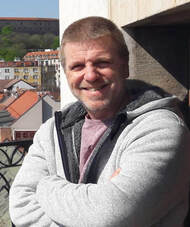 Pete lives on the shores of Lake Vänern in central Sweden. He spends his days in blue jeans looking after children, reading, writing and playing a little Bach on the guitar. He has been commended in many writing competitions, including LISP, Segora and New Millenium; and won a competition for Globe Soup. His work has appeared in numerous journals, notably Wells Street Journal, Strukturriss and Strands Magazine. He has also published a book of irreverent hiking anecdotes. On days off he hikes through Swedish skog, trying not to bump into moose. Again. Website: petearmstrong.com Short Fiction ~ Yvonne Clarke Honourable Mention, Strands International Flash Fiction Competition - 14 I must have been about eight years old. Our new house overlooked the water meadows and beyond to the river. When they started building opposite us, we local kids were thrilled with the promise of new adventures. We used the exposed clay to make models, filling breeze-block shops with fingernail-sized fruit and cakes which we painted with modelling enamels stolen from my brother’s bedroom. House foundations became fishing boats; we walked the plank on builders’ ramps, imitated high-wire circus acts on pine floor joists and climbed Everest on the rudimentary walls. Upstairs was the bridge of a cruise ship. I wanted to be the ship’s captain, like my father. David, the boy next door, was the chief officer. One evening, strange voices called us from the bridge. Had we been overrun by pirates? Did we have a mutiny on our hands? The characteristic cat-piss smell of damp plaster merged with the stink of cigarette smoke. I felt like Alice in Through the Looking Glass, or Lucy in The Lion, The Witch and The Wardrobe as we stepped off the ladder onto the rudimentary upstairs floor, hearts pounding like waves on rocks. Squinting through a fug of fag smoke we saw half a dozen youths perched like parrots on a pile of unlaid floorboards. They looked like the teddy boys who huddled together on street corners. Troublemakers, my dad always said. An amalgam of excitement and fear nailed us to the spot. Peppering their sentences with profanities, they told us to sit down and asked us about our families. I didn’t know the meaning of their swear words, but I could tell they were bad. They asked about my dog who I had taken for a walk earlier that day. I relaxed. They must be OK if they like animals, I deduced with the naivety of a child, so I chattered animatedly about my yappy terrier, how my Dad had just taken him to the vet for an operation, how I wouldn’t see him until the next day. They handed cigarettes to us. What good manners, I thought, although we handed them back. When it was our suppertime, they let us go, making us promise not to tell anyone about our meeting. The secret, like my guilt, remains with me to this day. Everything of value was taken from my house that night, but what I remember most vividly was a half-eaten tin of Spam left on Mum’s prized dining table and the juices had eaten away at the varnish. Even if my dog hadn’t alerted us to the robbery he would have barked at the scent of Spam. What a coincidence, the police officer said, that our dog was not in the house that night. The police told my parents they were still hunting for a gang who had escaped from a young offenders’ centre – they called it Borstal. As soon as I could, I climbed the ladder again in the half-built house. All that was left was a scattering of cigarette butts. ~ 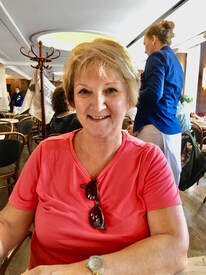 Yvonne has spent most of her life in the publishing industry, followed by teaching English as an Additional Language in secondary schools and 1:1 business English tutoring. She recently fell in love with the genre of flash fiction and short story writing and has had numerous pieces published online and in printed anthologies. She was a finalist in the 2019 London Independent Story Prize and won the Glittery Literary long short story prize Autumn 2021. She re-edits her work compulsively – old habits die hard! |
StrandsFiction~Poetry~Translations~Reviews~Interviews~Visual Arts Archives
April 2024
Categories |
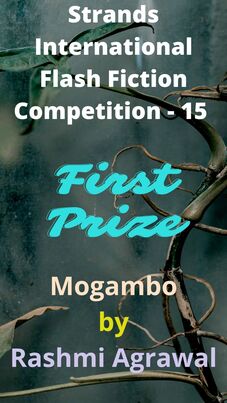
 RSS Feed
RSS Feed